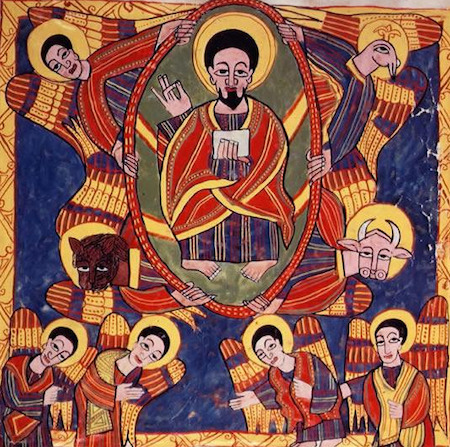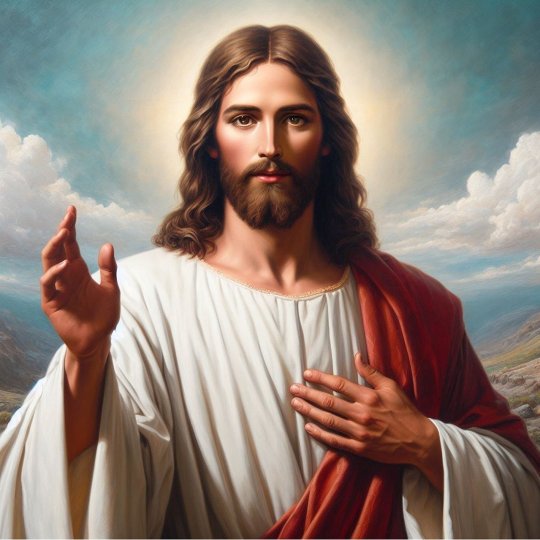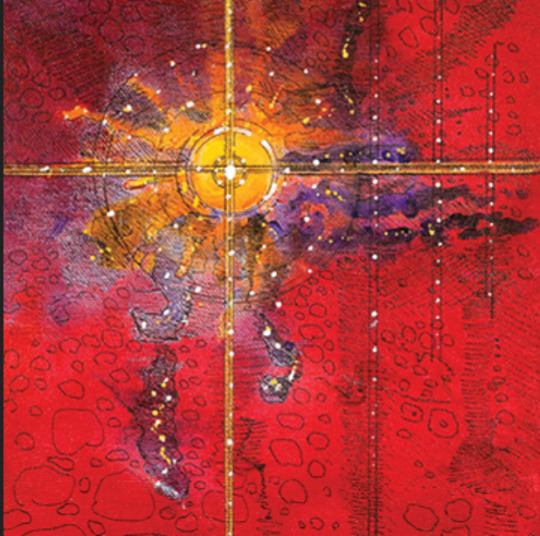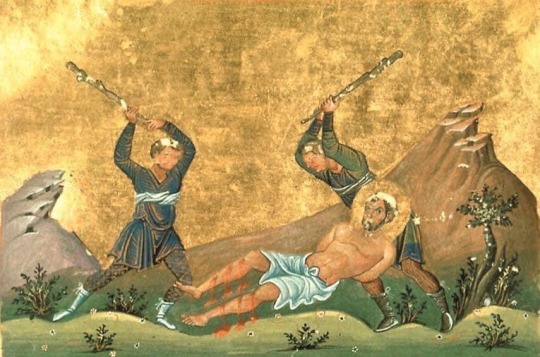#The Epistle of Colossians
Text

The Hope of the Gospel
If you stay strong, God will do that for you. You have to always remember the good news that you heard about Jesus, so that you keep on trusting him and know that he will save you. You see, God got his workers to tell people everywhere that Jesus died to save us. It is really good news. And I, Paul, am one of God’s workers now. My job is to tell people that good news.
— Colossians 1:23 | Plain English Version (PEV)
Plain English Version Bible © 2021 Wycliffe Bible Translators Australia
Cross References: Matthew 24:14; mark 16:15; Acts 1:8; Acts 2:5; Romans 10:18; 1 Corinthians 3:5; 2 Corinthians 10:1
#Gospel#hope#Good News#faith#established#God's workers#Jesus#atonement#death#salvation#trust#Colossians 1:23#The Epistle of Colossians#New Testament#PEV#Plain English Version Bible
23 notes
·
View notes
Text

And even when you were dead in transgression and the uncircumcision of your flesh, He brought you to life along with Him, having forgiven us all our transgressions; obliterating the bond against us, with its legal claims, which was opposed to us, He also removed it from our midst, nailing it to the Cross.
- The Letter of Saint Paul to the Colossians (2:13-14)
The elaborate metaphor here about how God canceled the legal claims against us through Christ's cross depicts not Christ being nailed to the cross by men, but "the bond … with its legal claims" being nailed to the cross by God.
- The New American Bible, Revised Edition's commentary on the above passage of Scripture.
St. Paul saw death as the "wages of sin" (Rom. 6:25). For love of us, Jesus made himself "sin" (2 Cor 5:21), "a curse" (Gal 3:13). The "double," which became the object of divine justice, is "sin," as personalized by St. Paul; it is the whole humanity of the "old man" which was crucified, that the sinful body might be destroyed (Rom 6:6). All of humanity was condemned upon the cross, and Christ set aside the decree of condemnation, nailing it to the cross (Col 2:14).
- Giulio Basetti-Sani, O.F.M. (The Koran in the Light of Christ: A Christian Interpretation of the Sacred Book of Islam, page 173), trans. W. Russell Carroll, O.F.M., and Bede Dauphinee, O.F.M.
You cancelled our condemnation by nailing it to the Cross,
—free us from our chains and lead us out of darkness.
- from the Catholic Liturgy of the Hours, Evening Prayer intercessions for the Tuesday of the Third Week of Easter.
#Crucifixion#Jesus Christ#Catholicism#Christianity#prayers#sin#redemption#Saint Paul#death#2 Corinthians#Epistle to the Romans#Letter to the Galatians#Letter to the Colossians
11 notes
·
View notes
Text
Worship That Is Fit For a King (Colossians 1:11-20)
Jesus is King. Neither you, nor I, are.
17th century Ethiopian Orthodox depiction of the glorified Christ
[May you be] strengthened with all power according to his glorious might so that you may have great endurance and patience, and giving joyful thanks to the Father, who has qualified you to share in the inheritance of his holy people in the kingdom of light. For he has rescued us from the dominion of darkness and brought us into…

View On WordPress
#Christ#christ the king#christ the king sunday#christian worship#colossians#colossians 1#jesus christ#jesus is lord#lord jesus#lordship of christ#pauline epistles#submission#worship
0 notes
Quote
He is the image of the invisible God, the firstborn of all creation; for in [by] him all things in heaven and on earth were created, things visible and invisible, whether thrones or dominions or rulers or powers—all things have been created through him and for him. He himself is before all things, and in [by] him all things hold together. He is the head of the body, the church; he is the beginning, the firstborn from the dead, so that he might come to have first place in everything. For in him all the fullness of God was pleased to dwell, and through him God was pleased to reconcile to himself all things, whether on earth or in heaven, by making peace through the blood of his cross.
Colossians 1:15–20 (NRSV)
0 notes
Text
While the Historical Paul has been subject to a dizzying array of historical reconstructions, what is rarely questioned is the assumption that whatever Paul is historically reconstructed via these operations will serve as a foundational figure for ethics, morality, politics, and theology. Cut away some pseudepigrapha here, contextualize an embarrassing statement over there, build a few analogical links between his context and ours, and we will get a Paul that can ground our ethics. Of course, not everyone in the field is invested in Paul's continuing relevance, but I think most Pauline scholars are interested in him because, at some level, they are convinced that a properly historicized Paul has something to say to their corner of (post)modernity.
A good example of how this process works is Eric C. Smith's recent monograph Paul the Progressive? Smith, a historian of early Christianity, writes for a progressive Christian audience while drawing from the rhetorical techniques of historicism to transform Paul into a modern progressive ally: "After years of studying Paul within the academic field of biblical studies, I have come to see [Paul] as one of the most misunderstood figures of the Bible and the Christian tradition. . . . The Paul that is revealed in careful study of his letters is nothing like the person so many progressive Christians hate, and, in fact, he shares many progressive Christian values".
[ . . . ]
Take, for example, Smith's chapter on Paul and slavery. He is at pains to absolve Paul of criticism for the historical support that the apostle's archive has given to slavery, ancient and modern. His approach takes several steps, some of which follow his scholarly "ground rules." First, he subtracts from Paul any references to slavery that come from deutero-Pauline literature (notably Ephesians, Colossians, and the pastoral Epistles). This gets rid of the most baldly pro-slavery passages in the Pauline archive. Turning to the uncontested letters of Paul, Smith argues that Paul's advice to slaves in 1 Corinthians 7 to remain in their state is much more ambiguous than most modern translations suggest and that Paul might be encouraging slaves to take the opportunity to gain their freedom if the possibility presents itself. But even this reading of Paul's advice hardly counts as "progressive." Manumission was a regular part of ancient slavery, something many slaves could count on and expect. Manumission was also used by ancient slavers as an inducement to good behavior that ultimately served as a means of maintaining the system itself, a point made forcefully by Jennifer Glancy. Paul's advice to slaves, charitably read, was to work within the system as it was set up.
[ . . . ]
We might think that accepting the institution of slavery would disqualify Paul as a progressive, but this is where Smith's rhetorical moves subtly shift the goalposts. First, he compares his pared-down Paul with the worst excesses of the American slave system, which gives the impression that Paul was not that bad. Pointing to the explicitly pro-slavery statements in the deutero-Paulines, Smith concludes that "it was not Paul's writings that were to blame, or Paul himself, but it was the misuse of Paul, both deliberate and accidental," that put him on the side of slavery as an institution. Smith assumes that the Christian texts written after Paul in his name represent a betrayal of Paul's theological vision. He does not entertain the possibility that these later devotees of the apostle saw him as an ally in their support for the ancient status quo and not as a problematic progressive needing to be contained.
Second, Smith recontextualizes Paul so as to take away the blame somewhat for his acceptance of slavery. He does this by claiming Paul believed that the world would soon end, thus making him less likely to try to overturn accepted social institutions. Paul's world was one in which slavery was normal, and he should not be blamed for accepting slavery as a given. Finally, Smith can conclude that Paul was not a "slavery apologist," which is the question that frames the entire chapter. What is so rhetorically clever here is that the entire chapter sets the goalposts in the most convenient location for Smith: Paul is absolved of being a full-throated supporter of slavery. What Smith has shown is that Paul accepted slavery as normal; he even felt comfortable enough playing with the terminology of human enslavement in his own self-descriptions. This hardly strikes me as an argument that Paul ought to be reclaimed as a progressive.
Even Smith seems somewhat abashed at making such an argument: "With the help of modern biblical scholarship we can recover a Paul who is far from a slavery apologist, and who might even be an ally in the struggle for emancipation". Smith's tepid endorsement of a Paul who "might even be an ally" should force us to ask the question, At what cost have we paid for Paul's own emancipation from his entanglement with slavery? Smith has pared Paul down, recontextualized him, lowered the bar, and still can't produce a Paul who can say that slavery is wrong, full stop. What are we saying to readers who have lived with the historical weight of the Pauline archive's support of slavery when we ask them to welcome someone who only "might" be an ally in their struggle? This strategy is what Joseph Marchal has recently called "pinkwashing Paul," in which a progressive figuration of the apostle is offered, "while ignoring or downplaying his letters' ambivalences, complicities, and recapitulations of imperializing and sexual naturalizing trajectories." More to the point: Why is Paul's purity so important? Why does he have to be the hero of our historical work? Must we value (or revere?) the corpora we study?
Cavan Concannon, Profaning Paul
28 notes
·
View notes
Text
@intimate-mirror
i don't think "the new testament texts are much more likely to have a single author each", given that a bunch of them say they're written by Paul
the arguments against Colossions being written by Paul seem rather weak to me, largely founded on mistaken assumptions about how people use language
i think the perception that the arguments against colossians not being written by paul are weaker is corroborated by the scholarly position, which AFAICT is much further from consensus than it is on other issues of NT authorship (like, the pastoral epistles show a much more overt philosophical tension with the rest of paul's writing that would need to be explained if we attributed them to paul)
but i admit that NT authorship stuff is much less interesting to me, and therefore i have looked into it much less than OT stuff.
7 notes
·
View notes
Text
God’s Anointing and Power in Our Lives
Mankind in a fallen, captive state, is incapable of rising to the high stature, high calling of God. Thanks be to God, for the anointing that removes burdens and breaks the yokes of sin, that keeps us bound.
God anointed Jesus Christ, our Lord and Savior, with the Holy Ghost and with power, who went about doing good, and healing all that were oppressed of the devil; for God was with Him. (See Acts 10:38)
"The Spirit of the Lord God is upon Me, because the Lord has anointed Me to preach good tidings to the poor; He has sent Me to heal the brokenhearted, to proclaim liberty to the captives, and the opening of the prison to those who are bound; to proclaim the acceptable year of the Lord, and the day of vengeance of our God; to comfort all who mourn, to console those who mourn in Zion, to give them beauty for ashes, the oil of joy for mourning, the garment of praise for the spirit of heaviness; that they may be called trees of righteousness, the planting of the Lord, that He may be glorified." (Isaiah 61:1-3)
At God's appointed time, "The Son of God was manifested, that He might destroy the works of the devil." (1 John 3:8)
Jesus who appeared in the flesh, and was in all points tempted as we are, yet without sin, was able to resist the devil, and cast Him out of many, for He was full of the Holy Ghost and power. This Jesus, is calling disciples to Himself, to live holy lives, and to proclaim the good news of salvation in the earth, with signs and wonders following.
All authority has been given to Me in heaven and on earth. Go therefore and make disciples of all the nations, baptizing them in the name of the Father and of the Son and of the Holy Spirit, teaching them to observe all things that I have commanded you; and lo, I am with you always, even to the end of the age." (Matthew 28:18-20)
"Behold, I give unto you power to tread on serpents and scorpions, and over all the power of the enemy: and nothing shall by any means hurt you. Notwithstanding in this rejoice not, that the spirits are subject to you; but rather rejoice, because your names are written in heaven." (Luke 10:19-20)
In order to be effective ambassadors for Christ, we must be sanctified and consecrated vessels, reconciled to God, fruitful in every good work; bringing glory to His name.
"And if Christ is in you, the body is dead because of sin, but the Spirit is life because of righteousness. But if the Spirit of Him who raised Jesus from the dead dwells in you, He who raised Christ from the dead will also give life to your mortal bodies through His Spirit who dwells in you. For if you live according to the flesh you will die; but if by the Spirit you put to death the deeds of the body, you will live." (Romans 8:10-11)
"Do not be drunk with wine, in which is dissipation; but be filled with the Spirit. (Ephesians 5:18)
"Now He who establishes us with you in Christ and has anointed us is God, who also has sealed us and given us the Spirit in our hearts as a guarantee."
(2 Corinthians 1:21 and 22)
A Prayer:
All thanks and praise to God our Father, for Christ His Son: Prophet, Priest and King; for the blessing of the Holy Spirit, and the anointing that breaks the yokes, and sets us free; for the power to daily walk in the Spirit; for a new and living way; for an inheritance incorruptible, and undefiled, that doesn't fade away. Amen.
- A Walk In The Garden Devotions
Related Bible Readings:
In the Scriptures, God instructed Moses to make a holy anointing oil. (See Exodus 30:22-33 for its use and purpose.)
Luke 4:1-15; Luke 9:1-3; Luke 10:19 & 20; Acts Chapter 2; Isaiah 10:27; Matthew 11:28-30; Galatians Chapter 5; Colossians Chapter 1, 2, 3 and 4; Psalm 23, Jeremiah Chapter 1; Ephesians in its entirety; First Epistle of John 2:27-29; Acts Chapters 1 and 2; Romans Chapters 6 and 12; Hebrews 1:8 & 9; First Epistle of Peter in its entirety; Philippians Chapter 3; 2 Corinthians Chapter 5; Joel 2:28-32
#AnointingofGod#PowerofGod#anointedlives#holyliving#anointedchurch#AnointedJesus#anointeddisciples#HolyGhost
14 notes
·
View notes
Text
In Christian theology, kenosis (Ancient Greek: κένωσις, lit. 'the act of emptying'') is the "self-emptying" of Jesus. The word ἐκένωσεν (ekénōsen) is used in the Epistle to the Philippians: "[Jesus] made himself nothing" (NIV), or "[he] emptied himself" (NRSV) (Philippians 2:7), using the verb form κενόω (kenóō), meaning "to empty".
The exact meaning varies among theologians. The less controversial meaning is that Jesus emptied his own desires, becoming entirely receptive to God's divine will, obedient to the point of death—even death on a cross. Philippians encourages Christians to be similarly willing to submit to divine will, even if it comes at great personal cost.
source ♡
In coming to earth, the Son of God did not cease to be God, and He did not become a “lesser god.” Whatever the “emptying” entailed, Jesus remained fully God: “in Christ all the fullness of the Deity lives in bodily form” (Colossians 2:9).
It is better to think of Christ’s “emptying” of Himself as a laying aside of the privileges that were His in heaven. Rather than stay on His throne in heaven, Jesus “made himself nothing” (as the NIV translates Philippians 2:7). When He came to earth, “he gave up his divine privileges” (NLT). He veiled His glory, and He chose to occupy the position of a slave.
source ♡
2 notes
·
View notes
Text
Books of the Bible
Here is a detailed list of the 66 books of the Bible, divided by the Old and New Testaments, along with their divisions and categories:
**Old Testament:**
**Pentateuch (5 books):**
1. Genesis
2. Exodus
3. Leviticus
4. Numbers
5. Deuteronomy
**Historical Books (12 books):**
6. Joshua
7. Judges
8. Ruth
9. 1 Samuel
10. 2 Samuel
11. 1 Kings
12. 2 Kings
13. 1 Chronicles
14. 2 Chronicles
15. Ezra
16. Nehemiah
17. Esther
**Poetry/Wisdom Books (5 books):**
18. Job
19. Psalms
20. Proverbs
21. Ecclesiastes
22. Song of Solomon
**Major Prophets (5 books):**
23. Isaiah
24. Jeremiah
25. Lamentations
26. Ezekiel
27. Daniel
**Minor Prophets (12 books):**
28. Hosea
29. Joel
30. Amos
31. Obadiah
32. Jonah
33. Micah
34. Nahum
35. Habakkuk
36. Zephaniah
37. Haggai
38. Zechariah
39. Malachi
**New Testament:**
**Gospels (4 books):**
40. Matthew
41. Mark
42. Luke
43. John
**History (1 book):**
44. Acts
**Pauline Epistles (13 books):**
45. Romans
46. 1 Corinthians
47. 2 Corinthians
48. Galatians
49. Ephesians
50. Philippians
51. Colossians
52. 1 Thessalonians
53. 2 Thessalonians
54. 1 Timothy
55. 2 Timothy
56. Titus
57. Philemon
**General Epistles (8 books):**
58. Hebrews
59. James
60. 1 Peter
61. 2 Peter
62. 1 John
63. 2 John
64. 3 John
65. Jude
**Apocalyptic (1 book):**
66. Revelation
This list represents the traditional order and grouping of the books of the Bible in most Christian denominations.

These are the 66 books that make up the Bible.
Title: The Significance of Each Book of the Bible
Introduction:
The Bible is a collection of 66 books that together form the inspired Word of God. Each book has its own unique message, themes, and significance that contribute to the overall story of God's redemption and love for humanity. Let's explore the importance of each book of the Bible.
Lesson Points:
1. The Old Testament:
- Genesis: The book of beginnings, detailing creation, the fall, and the establishment of God's covenant with His people.
- Exodus: The story of the Israelites' liberation from Egypt and the giving of the Law at Mount Sinai.
- Psalms: A collection of songs and prayers that express a range of human emotions and provide a guide for worship.
- Proverbs: Wisdom literature that offers practical advice for living a righteous and wise life.
- Isaiah: Prophecies about the coming Messiah and God's plan of salvation.
2. The New Testament:
- Matthew: Emphasizes Jesus as the fulfillment of Old Testament prophecies and the establishment of the kingdom of God.
- Acts: Chronicles the early spread of the Gospel and the growth of the early church.
- Romans: Explains the doctrine of justification by faith and the implications of salvation through Christ.
- Corinthians: Addresses issues within the church and provides practical guidance for Christian living.
- Revelation: Offers apocalyptic visions of the end times, the victory of Christ, and the establishment of the new heaven and earth.
3. Themes and Messages:
- Each book of the Bible contributes to the overarching themes of God's love, redemption, forgiveness, and salvation for all humanity.
- Together, these books provide a complete narrative of God's work in the world and His plan for His people.
Application:
- Take time to explore and study each book of the Bible, seeking to understand its unique message and significance.
- Reflect on how the themes and stories in the Bible can impact your own life and faith journey.
- Consider how the teachings and examples in the Bible can shape your beliefs and actions as a follower of Christ.
Conclusion:
The books of the Bible are not just separate entities but are interconnected parts of the larger story of God's redemption and love for humanity. Each book has its own importance and contributes to the overall message of God's plan for salvation. May we approach the study of the Bible with reverence and openness to the wisdom and guidance it offers for our lives.

2 notes
·
View notes
Text
SAINT OF THE DAY (February 16)

St. Onesimus was a slave to Philemon, an influential man who had been converted by St. Paul.
Onesimus offended Philemon and fled in order to escape any sort of retribution.
He then met St. Paul while Paul was in a Roman prison. Shortly after, Onesimus was baptized.
Paul then sent a letter to Philemon asking for Onesimus' freedom, so Onesimus could become one of his own assistants.
This letter is the Epistle to Philemon and entreats Philemon to accept Onesimus “no longer as a slave, but more than a slave, a brother, beloved especially to me.”
Philemon pardoned Onesimus and he returned to faithfully serve St. Paul.
We know that St. Paul made him, with Tychicus, the bearer of his Epistle to the Colossians (Col. 4:7-9).
Later, as St. Jerome and other fathers testify, he became an ardent preacher of the Gospel and succeeded St. Timothy as bishop of Ephesus.
He was cruelly tortured in Rome for 18 days by a governor who was infuriated by his preaching on the merit of celibacy.
Onesimus' legs and thighs were broken with bludgeons before he was stoned to death.
His martyrdom occurred under Domitian in the year 90.
2 notes
·
View notes
Text

CHRIST IN YOU
"It is God who is at work in you, both to will and to work for His good pleasure." Philippians 2:13
God does not see us in ourselves - He sees us in Christ. He does not see us, He sees Christ in us. If we really believed that, we would be delivered from ourselves and would indeed be triumphant Christians.
WE ARE NOT DEFINED BY OUR PAST
We must develop the mind-set that -- we are not defined by our past, what people think of us, or our circumstances - but only by who we are in Christ.
"To whom God would make known what is the riches of glory of this mystery among the Gentiles; which is Christ in you, the hope of glory." - Colossians 1:27
We step into our future (God's CALLING on our lives) with great boldness and confidence knowing certain that Christ has paid the price for complete freedom – all our sins have been forgiven – we are always in right standing with God and free to bear fruit that remains for His advancing Kingdom.
UNDERSTANDING OUR INHERITANCE IN CHRIST IS VITAL
We know who we are in Christ without doubt or fear. We are sons and daughters of God by His marvelous grace. We have the Blood of Jesus flowing through us. By His Blood we overcome the darkness of this world. We are all anointed for the DISCIPLESHIP of new believers into their Christ identity as we follow the Spirit's leading. Too many in the Church have limited themselves and limited God by not understanding their inheritance in Christ and their right standing with God.
By praying the scriptures in the epistles of Paul that pertain to our inheritance in Christ we come to know who we are in Christ; the power that is flowing through us and our authority over sickness, distractions, or other issues of life. Our body is the temple of God and we have the right to take authority over every area of it – spirit, soul, and body.
HIS POWER IS PERFECTED IN WEAKNESS
Christ in us is our hope of glory. When we are weak, He is strong. As 2 Corinthians 12:9-10 says:
"And He has said to me, 'My grace is sufficient for you, for power is perfected in weakness.' Most gladly, therefore, I will rather boast about my weaknesses, so that the power of Christ may dwell in me. Therefore I am well content with weaknesses, with insults, with distresses, with persecutions, with difficulties, for Christ's sake; for when I am weak, then I am strong."
ALBERT FINCH MINISTRY
3 notes
·
View notes
Text

The Supremacy of Christ
But now he has reconciled you by Christʼs physical body through death to present you holy in his sight, without blemish and free from accusation.
If you continue in your faith, established and firm, and do not move from the hope held out in the gospel. This is the gospel that you heard and that has been proclaimed to every creature under heaven, and of which I, Paul, have become a servant.
— Colossians 1:22-23 | The Books of the Bible NT (BOOKS)
The Books of the Bible NT Copyright © 1973, 1978, 1984, 2011 by Biblica, Inc. ® All rights reserved worldwide.
Cross References: 2 Samuel 22:24; Matthew 24:14; Mark 16:15; Acts 1:8; Acts 2:5; Romans 7:4; Romans 10:18; 1 Corinthians 3:5; 2 Corinthians 4:14; 2 Corinthians 5:18; 2 Corinthians 10:1; Ephesians 1:4; Ephesians 2:16; Ephesians 5:27
#Gospel#hope#Good News#faith#Jesus Christ#atonement#death#salvation#trust#God's workers#established#Colossians 1:22-23#The Epistle of Colossians#New Testament#BOOKS#The Books of the Bible NT#Biblica Inc.
11 notes
·
View notes
Photo

Today we also celebrate the Holy Apostles of the Seventy, Archippus, Philemon and Apphia. These Saints were students and companions of the holy Apostle Paul. In the Epistle to Philemon, the Apostle Paul names Saint Archippus as his companion, and mentions him again in the Epistle to the Colossians (Col. 4:17). Saint Archippus was bishop of the city of Colossae in Phrygia. Saint Philemon was an eminent citizen of this city, and the Christians gathered in his home to celebrate church services. He was also made a bishop by Saint Paul and he went about the cities of Phrygia, preaching the Gospel. Later on, he became archpastor of the city of Gaza. Saint Apphia, his wife, took the sick and vagrants into her home, zealously attending to them. She was her husband’s co-worker in proclaiming the Word of God. During the persecution against Christians under the emperor Nero (54-68), the holy Apostles Archippus and Philemon and Apphia were brought to trial by the ruler Artocles for confessing faith in Christ. Saint Archippus was brutally slashed with knives. After torture, they buried Saints Philemon and Apphia up to the waist in the ground, and stoned them until they died. May they intercede for us always + Source: https://www.oca.org/saints/lives/2023/02/19/100557-apostles-of-the-seventy-archippus-and-philemon-and-martyr-apphia (at Denizli) https://www.instagram.com/p/Co0FhEDLqng/?igshid=NGJjMDIxMWI=
14 notes
·
View notes
Text

Mystery Revealed, by James Fissel
For in Him all fullness was pleased to dwell,
and through Him to reconcile all things for Him,
making peace by the blood of His cross,
through Him, whether those on earth or those in heaven.
The Epistle of Saint Paul to the Colossians (1:19-20)
We are all brethren in that we have one Creator and Lord, who is Father to us all. That brotherhood we share with animals and inanimate nature. We are also brethren one to another as descendants of one earthly father, Adam, and the only creatures made in God's Image. But even this is common to all nations. More especially, however, we are brethren in that we […] above all else, share one Mother, the Holy Church and true piety, the author and finisher [or perfector] of which is Christ, the rightful Son of God. Not only is He our God, but He was well-pleased to be our Brother, our Father, and our Head, bringing us all together into one Body and making us members of one another and of Himself.
Gregory Palamas (On Peace §1, a homily given in December of 1350 or January of 1351)
#Christianity#Orthodox Christianity#Logos#Jesus Christ#Imago Dei#Adam and Eve#creation#Ecclesia#Saint Paul#Letter to the Colossians#Gregory of Palamas
8 notes
·
View notes
Text
RHAPSODY OF REALITIES DAILY DEVOTIONAL ~ PASTOR CHRIS
THURSDAY, APRIL 13TH
ALL BLESSINGS FULFILLED IN CHRIST
Giving thanks unto the Father, which hath made us meet to be partakers of the inheritance of the saints in light
(Colossians 1:12).
In Exodus 19:5, God spoke to Moses and instructed him to tell the Israelites that if they’d obey his voice, then they’d be His treasured possession—a priestly kingdom and a holy nation: “Now therefore, if ye will obey my voice indeed, and keep my covenant, then ye shall be a peculiar treasure unto me above all people: for all the earth is mine: And ye shall be unto me a kingdom of priests, and an holy nation…” (Exodus 19:5-6).
But thanks be unto God! The promise that was preconditioned on their obedience to God’s commandment has been given to us and fulfilled in us in Christ. God ushered us into this by the new birth in Christ. Hallelujah!
Hence the Apostle Peter declares in his epistle, “But you are a chosen race, a royal priesthood, a dedicated nation, [God’s] own purchased, special people, that you may set forth the wonderful deeds and display the virtues and perfections of Him Who called you out of darkness into His marvelous light” (1 Peter 2:9 AMPC).
In Revelation 1:5, observe the tenses used: “And from Jesus Christ, who is the faithful witness, and the first begotten of the dead, and the prince of the kings of the earth. Unto him that loved us, and washed us from our sins in his own blood.” He loved us and washed us from our sins in his own blood!
The 6th verse says He has made us kings and priests unto God and His Father; to Him be glory and dominion for ever and ever. Amen. No wonder the Spirit says through Paul in 2 Corinthians 1:20, “For all the promises of God in him (Christ) are yea, and in him Amen, unto the glory of God by us." Hallelujah!
PRAYER
Dear Father, I thank you for granting me all spiritual blessings in heavenly places in Christ Jesus. I’m delighted to know that I’m your treasured possession, ordained to show forth your wonderful deeds and display your virtues and perfections. Thank you for making me your righteousness and the effulgence of your glory, in Jesus’ Name. Amen.
FURTHER STUDY:
Romans 6:17; Romans 5:18-19
2 notes
·
View notes
Text
Today the Church remembers Saint Onesimus, Bishop.
Ora pro nobis.
Saint Onesimus was a slave of Philemon, a person of note of the city of Colossae in Phrygia who had been converted to the Faith by St. Paul. Having robbed his master, and being obliged to flee, he met with St. Paul, then a prisoner for the Faith at Rome, who converted and baptized him, and entrusted him with his canonical letter of recommendation to Philemon.
By him, it seems, Onesimus was pardoned, set at liberty and sent back to his spiritual father, whom he afterwards faithfully served, for apparently St. Paul made him, with Tychicus, the bearer of his epistle to the Colossians, and afterwards, as St. Jerome and other Early Church Fathers witness, a preacher of the gospel and a bishop.
It is he who succeeded Saint Timothy as bishop of Ephesus.
He was cruelly tortured in Rome for eighteen days, by a governor of that city, infuriated by his preaching on the merit of celibacy. His legs and thighs were broken with bludgeons, and he was then stoned to death. His martyrdom occurred under the reign of Emperor Domitian during the persecution of Christians under Trajan in the year AD 95.
We thank you, Lord Jesus, for faithful witnesses like Onesimus who were willing to give their lives as living witnesses of the Faith. We pray, Lord, that St. Onesimus and St. Paul and all the saints in heaven will pray for us that we also may be strong in the Faith and by your Holy Spirit be able to stand firm as witnesses.
Amen.


#father troy beecham#christianity#jesus#saints#god#salvation#martyrs#faith#early church#new testament
2 notes
·
View notes